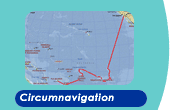This section encompasses a collection of stories and
passage notes written while underway during the first leg of Voyage
Two of Pacific Bliss, the 3252 nautical mile passage from San
Diego, California to Atuona Harbor in the island of Hiva Oa, Marquesas,
French Polynesia.
_____________________________________________________________
April 9, 2002, 0015
0º47' N, 133º09.8' W
47 miles north of the equator
Stars of Wonder
Imagine yourself seated in the IMAX science museum theater in Balboa
Park, San Diego (or any other similar observatory). The lights have
dimmed. The room around you has become dark. Suddenly, all the constellations
en masse burst upon the 180º dome surrounding you, a million flickering
stars transporting you to another world, and you forget that your environment
has been created for you by man.
You begin to glide gently forward, skimming the ocean waves. You know
you are moving because you hear the slosh-slosh of the boat's hulls
against the waves, the occasional creak-creak of the swaying mainsail,
reaching high to the starry sky above. You become enthralled with the
millions of flickering lights wherever you turn, and find that you are
encased in a dome, surrounded by stars so tightly crowded together that
they resemble a thousand Milky Ways.
You become mesmerized. You find many sections of the sky where you
cannot even separate the individual stars from the primordial soup.
You are seeing beyond to distant constellations that you've never heard
of or seen before.
The back of your neck is hurting now, but still you strain to look
upward. An audio portion of the program tells you that you are seeing
the light of stars that are taking millions of light years to come to
you and that the visible universe spans between 16 and 40 billion light
years across. You feel unimportant, insignificant, but still you crane
your neck ever upwards, in awe of the heavens spread out before you.
You have come with us, on Pacific Bliss this night, only 42
miles from the equator. I thank you for your company.
"A wonderfully starry night," I had written in my logbook.
"The stuff dreams are made of." When I first came on the midnight
to 3AM dogwatch tonight, I forgot that the purpose is to look for ships
in the night. I was awestruck by the stars, mesmerized for the first
ten minutes.
Tomorrow, we will cross the line. And of course, we will do all the
crazy things sailors do: perform saltwater initiation rites, dress up
in costumes, and offer champagne to the mythological gods of the sea.
But tonight, I cannot help but turn my thoughts to the real God, the
Creator of all of this. How could I possibly begin to think that an
insignificant spec in a little vessel, way down here, could make any
difference, could even get the attention of this God who masterminded
the creation of the universe? I think about it tonight, and it seems
impossible. Yet I remember that I prayed about Ray, that we would solve
the problem during the daylight hours, knowing that I feared going into
the night without a working autopilot, (yes, I did, I admit it) and
I felt that my prayers were answered. I've prayed for an answer to much
bigger things, and received it. Perhaps He assigns a guardian angel
to His children down here, because if I pray for a wee little thing,
like a parking spot when I'm late for an appointment, it materializes
for me. I cannot begin to understand it more than I can understand the
reasons why God designed this whole universe. Did he design it for the
race of man he would eventually create? Has he designed other races
of men, and did they also foul things up so badly that he needed to
make a redemption plan for them?
Everything speaks for super-intelligent design, yet did all that design
work go into creating a habitat for the imperfect beings who live here?
God created the perfect universe (Genesis 1:31) "God saw all that
He had made, and it was very good."
NASA astronomer John O'Keefe said that to the astronomer, the Earth
is a very sheltered and protected place. There is a marvelous picture
from Apollo 8 of the blue and cloud-wrapped earth, seen just at the
horizon of the black-cratered, torn and smashed lunar landscape. The
contrast would not be lost on any creature. The thought, "God loves
those people," cannot be resisted. Yet the moon is a friendly place
compared to Venus, where, from skies 40 km high, a rain of concentrated
sulphuric acid falls toward a surface that is as hot as boiling lead.
Then O'Keefe went on to say that Venus is friendly compared to the cold
and lonely vacuum that separates the stars, which is friendly compared
to the crushing pressure of the white dwarfs or the unspeakable horrors
of the black holes or neuron stars. "We are by astronomical standards,
a pampered, cosseted, cherished group of creatures…if the Universe
had not been made with the most exacting precision we could never have
come into existence. It is my view that these circumstances were created
for man to live in…Someone made a lot of special arrangements and
took a lot of time so that each of us could be alive and experiencing
this just-right world."
When I read passages in "Show Me God" (by Fred Heeren, Revised
Edition ©2000) today, I did not know that it would be in preparation
for this wondrous night.
I also did not know that so many believers led the way in science.
The book's appendix summarizes fifty of them, from well-known names
such as Bell, Boyle, Dalton, Faraday, Fleming, Joule, Lister, Maxwell,
Mendel, Morse, Newton and Pasteur to lesser-known scientists such as
Albright, Fabre, Flamsteed, Huggins, Michell, Theodoric of Freibourg,
and others.
journal62.html
|











